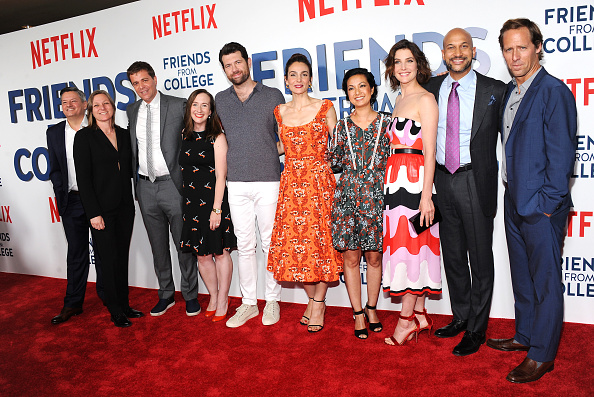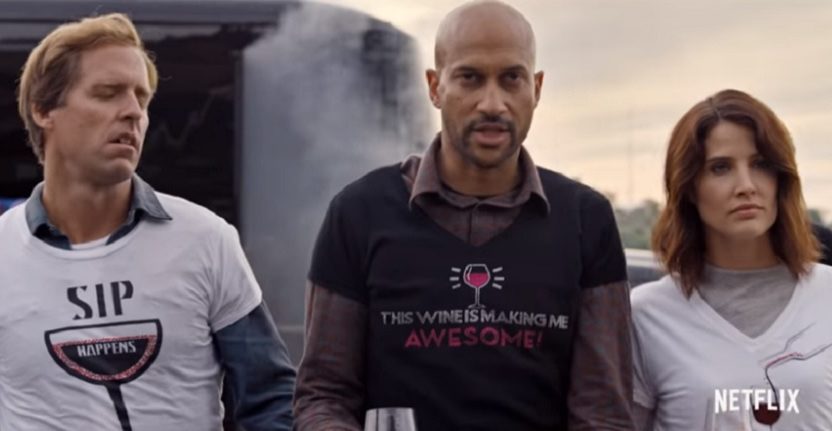Last Friday, highly-anticipated (by your author, anyway) Netflix comedy Friends From College premiered with its “Hey, I know him/her!” cast and big nostalgia play front-and-center. The trailer for the eight-episode series was released in June, grasping at a wide audience from the start.
You, the potential viewer, saw the name alone and associated it immediately with your own “friends from college,” assuming you’re age 40 or younger. But those involved with the project also cast a broad net of target demographics. Keegan-Michael Key (Ethan) is best known for his work on sketch comedy show Key and Peele, which had some general appeal, but could skew toward men in their 20s. Cobie Smulders (Lisa) played Robin in How I Met Your Mother, which appealed to both men and women currently aged 25-40.
Fred Savage (Max) skews even older as the former star of classic family nostalgia play The Wonder Years. Nat Faxon’s (Nick) has written smart comedies like The Descendants and The Way Way Back, yet this sophomoric comedy goes in the complete opposite direction (younger). Jae Suh Park (Marianne) has some limited comedy chops from The Mindy Project, and Annie Parisse (Sam) hasn’t really done much comedy at all. Co-creator Nicholas Stoller’s most notable credits include writing comedies like Yes Man, Get Him to the Greek and The Five-Year Engagement, among others.
That’s a long-winded way of saying there’s probably something for everybody here, despite it being a show about college friends 20 years later.
(some spoilers ahead)
Or at least there should’ve been, if the show had really been about college friends 20 years later — which is the crux of its problems, despite all of the promise and broad appeal laid out above.
You go into Friends From College wanting that nostalgia to deliver for you. From the memories you derive from the title alone, or the actors and actresses who once portrayed characters you loved, there’s almost too much expectation from the jump.
So when you’re inundated with a story about an affair at the beginning, you’re willing to look past it because of the promise of the premise. “Oh, this just a sub-dynamic of these friends from college. They’ll get to the funny at some point.”
And in episode two, you’re begging them to get on with that and the much-needed character development that will make you care about these six people as individuals and in the larger group. Why are these friends from college worth viewing from afar (and up close) for eight episodes this summer? Why are they interesting? And what reasons does the show provide you with to help you look past some pretty severe character flaws to assure you that they’re all inherently good people just making mistakes?
The reasons never truly come.
Through four episodes, you learn very little about these friends from college while they were in college, or in the 20 years since. You’re not sure who they are or were. There’s a handful of jokes trotted out from years gone by, and some of them hit (“Monica Lewinsky: The Musical” and its lengthy song-and-dance elicit quite a few laughs). But the main, recurring college in-joke for them seems to be Sam’s continued use of the “Froshie” nickname for Lisa, three years the rest of the group’s junior.
Sam claims it’s a term of endearment, but its realities lie in a coded distance from Lisa as an actual friend in the group. If Sam refuses to call Lisa by her name, then the continued affair between her and Lisa’s husband Ethan won’t be as much of a betrayal. That dynamic is (detrimentally) at the center of the show, to the point of distraction. But beyond that, what other meaningful — positive or negative — connections really occur between the show’s walls? Even Smulders’s powerful performance in the “Mission Impossible” episode about the couple’s struggles with IVF is muddied by the affair.
By that point in the season (episode four), you’ve potentially had enough of what’s been presented to you on screen, but the show’s promise could keep roping you along.
Maybe that’s the entire takeaway, though. These friends from college are only that. Friends from college and no longer true friends at all. Marianne keeps a secret for Sam, despite her proximity to Lisa (whose marriage would be ruined by knowledge of the affair). Max is willing to put in more work as Ethan’s agent because of their long-time association (despite the obvious lack of benefit for either party). Nick and Marianne spend much of the season existing on the outside of a friend group of which they’re supposedly core members.

They’re not friends anymore, but just associated with one another by way of 20 years of history.
If anything, this is what the show probably nails, rather than the premise you assume of it. Friends From College is an emotional tug-of-war that tries to mimic the reality it otherwise removes itself from. Greg Germann’s Jon (Sam’s husband) seems to be the only character fully aware of the absurdity and lack of importance of these relationships.
This isn’t about friends at all. It’s about the miserable, downward spiral of these people that just pretends this level of disconnect, muted emotional understanding and failure to care is normal.
Friends From College failing in that regard isn’t necessarily all right, but it’s also par for the course when it comes to comedies of late. Vox called it a “bad show about worse people.” And while that may be a bit too dismissive of the work put in by some of the cast in spurts (again, Smulders in particular, as well as Key’s big personality which at times borders on caricature), it does hit on the show’s big problem.
There’s nothing to root for here. These people aren’t friends at all. And the supposed premise isn’t at all what it seems. Was that the point? Even if so, everyone gets sort of lost on the road to get there, despite the enormous promise presented up front.







